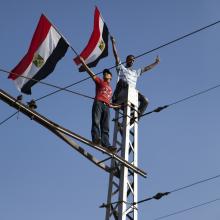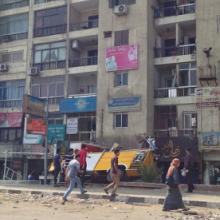muslim brotherhood
On May 21, the National September 11 Memorial and Museum in New York is scheduled to release “The Rise of Al Qaeda,” a seven-minute film telling the story of the attacks. Full disclosure: I have not watched the film.
Here’s why the 9/11 museum should drop these terms from the film.
After decades of polarization along religious lines, Christians and Muslims in Egypt are coming together to rally behind their flag.
The country is in the midst of a swell of nationalism that began during the revolution in 2011 and intensified when citizens took to the streets in June of this year to call for the removal of President Mohammed Morsi of the Muslim Brotherhood.
Egyptian flags adorn houses and buildings throughout the capital, and everything — from sandbags buttressing military blockades to pillars along the Nile Corniche — has been painted in the national colors of black, white, and red.
The backlash against Muslim Brotherhood rule in Egypt comes as secular forces across the Middle East are rising up in opposition to political Islam. Divisions reach from top leaders to the street.
Political leaders in Saudi Arabia, United Arab Emirates, Kuwait and Jordan have sided with the Egyptian military and secularists who backed the July 3 ouster of President Mohammed Morsi.
On the streets of Cairo over the weekend, mobs and snipers attacked Morsi supporters, forcing security forces accused of slaughtering the Islamists to stand between them and the mob. The violence in Egypt echoes similar, though less deadly, backlashes against Islamic ruling parties in Tunisia, and Turkey.
Egypt now teeters on the edge of an abyss. Sen. John McCain (R-Ariz.), who was in Cairo earlier this month at President Obama’s request to mediate between the military-backed interim government and supporters of ousted President Mohammed Morsi, told CBS News: “Oh my God, I didn’t know it was this bad. These folks are just days or weeks away from all-out bloodshed.”
The widely anticipated military crackdown against pro-Morsi demonstrators began last week, so we’d better brace for the blow-back.
The rising specter of repression in Egypt is difficult to watch for two reasons. First, it confirms that the counterrevolution is successfully restoring the deep state — the vast security apparatus upon which military autocracy in Egypt has been based since Gamal Abdel Nasser’s rule in the 1950s, effectively extinguishing any hope of transition to democracy. Second, the violent crackdown evokes bad memories of earlier efforts by Egypt’s military strongmen to crush their Islamist opposition.
The Islamic political party known as the Muslim Brotherhood has soured American attitudes towards Egypt, arguably America’s most important Arab ally, since its candidate Mohamed Morsi won presidential elections there in June 2012.
That’s according to a poll released Friday by the Arab American Institute in Washington, D.C.
Morsi’s term has been dogged by charges that he opts for authoritarian measures such as martial law. Muslim-Christian clashes have also shadowed his term; there were clashes on April 5 in the town of Khosus that killed four Coptic Christians and one Muslim, and violence also marred the April 7 funeral for the Copts who were killed in that conflict.
According to the Institute’s poll of 2,300 likely voters, only 36 percent of Americans had favorable views of Egypt, down from 66 percent in 1997. At least some of the decline has been attributed to the Muslim Brotherhood, which won Egypt’s parliamentary elections in January 2012, and to Morsi himself, who won the presidency last June by a 52-48 percent margin.
On Wednesday, 42 interfaith religious and advocacy organizations signed on to a letter condemning Rep. Michele Bachmann and others in Congress for their accusations that the Muslim Brotherhood had infiltrated the U.S. government.
The claims — one aimed at Sec. Hillary's Clinton aideHuma Abedin — have also been condemned by members on both sides of the aisle. One of the most impassioned defenses of Abedin came from Sen. John McCain (R - Ariz.), saying, "When anyone, not least a member of Congress, launches specious and degrading attacks against fellow Americans on the basis of nothing more than fear of who they are and ignorance of what they stand for, it defames the spirit of our nation, and we all grow poorer because of it.”
WASHINGTON, D.C. — Accusations by Rep. Michele Bachmann, R-Minn., that an Islamist group has infiltrated the U.S. government are drawing fierce criticism from fellow lawmakers and religious groups.
Bachmann and four other GOP legislators have sent letters to five government agencies citing "serious security concerns" about what Bachmann has called a "deep penetration in the halls of our United States government" by the Muslim Brotherhood.
Bachmann also accused Huma Abedin, an aide to Secretary of State Hillary Rodham Clinton and former Rep. Anthony Weiner's wife, of having family connections to the Muslim Brotherhood.
Sen. John McCain, R-Ariz., defended Abedin. "These attacks on Huma have no logic, no basis and no merit, and they need to stop now," he said in a Senate speech on Wednesday.
Bachmann's letters cite a report by Frank Gaffney, a conservative who has accused President Obama of "embracing the agenda of the Muslim Brotherhood."
The fate of Copts looks as tenuous as ever as Egyptians struggle to determine who won this weekend's first-ever democratic presidential elections. Presented with what many saw as a lose-lose proposition, Egyptians had a choice between Ahmed Shafiq, former prime minister of ousted leader Hosni Mubarak, or Mohammed Morsi of the Muslim Brotherhood, who many fear will turn the country into an Islamic state.
Though final results are not yet in, the Muslim Brotherhood has projected its candidate as the winner. Within hours, Egypt’s military caretaker government, which is seen as sympathetic to Mubarak's old regime, issued an interim constitution that granted itself broad power.
Carl Moeller, who leads the Southern California-based Open Doors USA, an organization that works with persecuted Christians worldwide, estimates that approximately 100,000 Coptic Christians abandoned the country for the U.S. or Europe last year following the turbulence of the Arab Spring and attacks on Coptic churches.
In recent weeks, Facebook and other social media have clearly demonstrated their capacity to do far more than just allow us to keep in touch with our family and friends. They have proven to be powerful organizing tools, capable of assisting in the creation of broad international movements for social change. Social media has proven to be a particularly powerful tool in countries in which basic democratic rights such as a free press and the right to assembly are severely restricted. At the same time, Facebook and YouTube are increasingly rendering international borders as meaningless. Western media coverage of the recent popular uprising in Egypt consistently emphasized the catalytic role of Facebook in galvanizing youth and young adults to take action against an entrenched regime that had long been viewed as impenetrable. In the days after Mubarak's departure, both the New York Times and The Los Angeles Times published lead stories describing the role of certain Facebook pages in not only serving as a call to action, but as a space in which emerging activists in Tunisia and Egypt were able to share lessons with each other. These young activists had not only managed to evade the reach of both nations' security police, they had also sidelined older opposition parties such as the Muslim Brotherhood in Egypt.
For an entire week now we've watched tens of thousands of Egyptians march demanding a change in government. The police force has collapsed. The army is out in force. Residents are policing their own neighborhoods. President Mubarak is weighing his options. And the West is wondering what will happen next.






